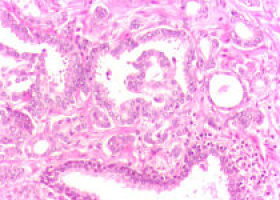
A newly developed small-molecular radiopharmaceutical pair has successfully visualised and treated melanoma in a preclinical study, according to new research presented at the Society of Nuclear Medicine and Molecular Imaging 2022 Annual Meeting. Targeting a receptor that is aberrantly overproduced in many human solid tumours, this theranostic (therapy + diagnostic) approach shows promise for non-invasive diagnosis and treatment of patients with various forms of cancer.
Metabotropic glutamate receptor 1 (GRM1) is aberrantly overproduced in a wide variety of human solid tumours, including melanoma. However, it is not found in normal surrounding organs. As such, GRM1 has been identified as a widely applicable target for theranostics for cancers.
In the study, researchers designed and developed a novel small-molecular radiopharmaceutical pair, [11C]1 and [211At]1, to target the GRM1.
The theranostic potential of the pair was then explored in GRM1 melanoma-bearing mice. In vivo PET imaging with [11C]1 was performed to visualise the melanoma, and an ex vivo biodistribution study was conducted to determine the uptake and clearance of the radiopharmaceutical. After imaging, mice were treated with [211At]1 and monitored for tumour growth and adverse side effects.
PET imaging with [11C]1 clearly visualised the tumours with good tumour-to-background contrast and with rapid clearance from normal organs after injection. In the therapeutic studies, [211At]1 successfully prevented tumour growth with only a single treatment. No decrease in body weight, liver or kidney damage, or other side effects were observed.
“The results of this study highlight the strong potential of using [11C]1 and [211At]1 as theranostic agents for the management of GRM1-positive tumours,” said Lin Xie, MD, PhD, a senior researcher in the Department of Advanced Nuclear Medicine Sciences at the National Institutes for Quantum and Radiological Science and Technology. “This radiopharmaceutical pair may have broad application and help to bring us one step closer to winning the fight against solid cancers.”
The World Cancer Declaration recognises that to make major reductions in premature deaths, innovative education and training opportunities for healthcare workers in all disciplines of cancer control need to improve significantly.
ecancer plays a critical part in improving access to education for medical professionals.
Every day we help doctors, nurses, patients and their advocates to further their knowledge and improve the quality of care. Please make a donation to support our ongoing work.
Thank you for your support.